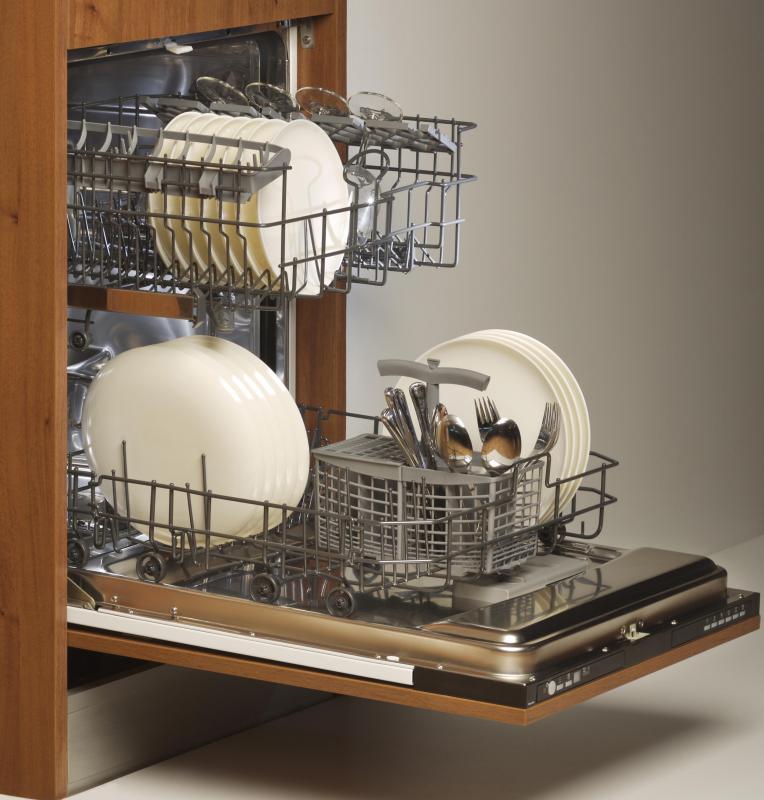At WiseGEEK, we're committed to delivering accurate, trustworthy information. Our expert-authored content is rigorously fact-checked and sourced from credible authorities. Discover how we uphold the highest standards in providing you with reliable knowledge.
What Causes Hard Water Spots?
Hard water spots are caused when water with a high calcium carbonate content evaporates. The calcium remains behind, and is the cause of the white spots. Hard water is classified as water with a one milligram of calcium carbonate per liter of water. This is sometimes referred to as one degree American, or one part per million. Hard water is naturally occurring and is typically found is mountainous areas or locations with a low water table.
Hard water has a high mineral content, comprised of calcium, magnesium, metal ions. It can also include biocarbonates and sulfates. The calcium is often in the form of limestone, chalk, or calcium sulfate. The most common source of magnesium is dolomite and metal ions can be derived from metal water pipes.

Many people report water spots on dishes removed from the dishwater, but not on dished washed by hand. Very hot water will result in an increased volume of water spots. An increased number of spots are created with the use of hot water and high heat drying.
To reduce hot water spots, water softener can be added to the hot water heater. These salt-based pucks are added every 30 to 60 days and dissolve slowly in the water tank. They are used to neutralize the salt through a simple, chemical reaction.

An ion exchange column can also be used. This unit is installed in the water heater and is reusable. The calcium and magnesium ions are attracted to the column. They bond to the column, releasing sodium ions. In time, the column becomes filled with calcium ions and must be flushed with water to refresh the ions. Once this is done, it can be replaced in the water heater.
Reduce the temperature of your dishwasher water to reduce the volume of hard water spots and flush the metal pipes to remove salt buildup that occurs naturally over time. Glass spot removers can also be purchased to remove these spots.
The most effective method of removing hard water spots is to dry dishes and glasses by hand. Once they are dry, the water cannot evaporate, leaving spots. Spots on shower doors are hard to remove, as they are often combined with soap residue.

There is a wide range of specific cleaning products available, designed to remove hard water spots. A low cost method of removing hard water spots from your shower doors is to wipe down the shower walls after use. This reduces the moisture on the wall, and therefore the water spots.
AS FEATURED ON:
AS FEATURED ON:















Discussion Comments
@indigomoth - Another thing to keep in mind is preventing the spots is easier than getting rid of them once they are there. That's why drying your dishes by hand is recommended, but you can also do things like wipe down your shower after using it, rather than letting it air dry.
Hard water spot removal can be a real pain if you let it go on too long. I have to agree that it's better to try and soften the water than deal with all the problems that come along with having hard water.
@pastanaga - I'm not sure if that's the best way to tell if an area has hard water, as if you're not used to soft water you might not realize how much the soap should be foaming.
There are several sites that show which places have hard or soft water, so you can check it out there.
Or, if you've got hard water spots, you can just take that as a proof that you've got hard water!
I find one of the best ways of cleaning hard water spots is to use baking soda and vinegar in a paste as a cleaner. Just pop it onto the spots for a few minutes then scrub at them a bit and they should go quite easily. I use this for pots and pans if they need it as well.
One way in which you can tell if you've got hard water in your area is by checking to see if soap will form suds if you agitate it in water. If it doesn't really foam up at all, it's probably because of the water.
If you do have hard water, you won't just be dealing with water spots. Hard water makes it difficult to get anything properly clean. It makes your clothes feel scratchy and dull, it makes your skin and hair feel bad since they retain a bit of soap that dries them out, and it can really ruin your plumbing over time.
It does supposedly add a bit of calcium and magnesium to your diet, but I'd personally rather have soft water and take a vitamin supplement than deal with hard water.
Your best bet is to take the advice of the article and set up some kind of hard water filter so that you don't have to deal with it at all.
Post your comments